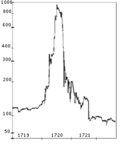Portal:Business
The Business and Economics Portal  Business is the practice of making one's living or making money by producing or buying and selling products (such as goods and services). It is also "any activity or enterprise entered into for profit." A business entity is not necessarily separate from the owner and the creditors can hold the owner liable for debts the business has acquired. The taxation system for businesses is different from that of the corporates. A business structure does not allow for corporate tax rates. The proprietor is personally taxed on all income from the business. A distinction is made in law and public offices between the term business and a company such as a corporation or cooperative. Colloquially, the terms are used interchangeably. (Full article...) Economics (/ˌɛkəˈnɒmɪks, ˌiːkə-/) is a social science that studies the production, distribution, and consumption of goods and services. Economics focuses on the behaviour and interactions of economic agents and how economies work. Microeconomics analyses what is viewed as basic elements within economies, including individual agents and markets, their interactions, and the outcomes of interactions. Individual agents may include, for example, households, firms, buyers, and sellers. Macroeconomics analyses economies as systems where production, distribution, consumption, savings, and investment expenditure interact; and the factors of production affecting them, such as: labour, capital, land, and enterprise, inflation, economic growth, and public policies that impact these elements. It also seeks to analyse and describe the global economy. (Full article...) Selected articleKeynesian economics (pronounced /ˈkeɪnzjən/), also called Keynesianism, or Keynesian Theory, is an economic theory based on the ideas of 20th century British economist John Maynard Keynes (pictured). Keynesian economics promotes a mixed economy, where both the state and the private sector play an important role. Keynesian economics differs markedly from laissez-faire economics (economic theory based on the belief that markets and the private sector operate well on their own, without state intervention). In Keynes's theory, general (macro-level) trends can overwhelm the micro-level behavior of individuals. Instead of the economic process being based on continuous improvement in potential output, as most classical economists had believed from the late 18th century on, Keynes asserted the importance of aggregate demand for goods as the driving factor of the economy, especially in periods of downturn. From this he argued that government policies could be used to promote demand at a macro level, to fight high unemployment and deflation of the sort seen during the 1930s. A central conclusion of Keynesian economics is that there is no strong automatic tendency for output and employment to move toward full employment levels. This conclusion conflicts with the tenets of classical economics, and those schools, such as supply-side economics or the Austrian School, which assume a general tendency towards a welcome equilibrium in a restrained money-creating economy. In neoclassical economics, which combines Keynesian macro concepts with a micro foundation, the conditions of General equilibrium allow for price adjustment to achieve this goal. Selected image
Selected economyThe economy of Peru is an emerging, mixed economy characterized by a high level of foreign trade and an upper middle income economy as classified by the World Bank. Peru has the forty-seventh largest economy in the world by total GDP and currently experiences a high human development index. The country was one of the world's fastest-growing economies in 2012, with a GDP growth rate of 6.3%. The economy was expected to increase 9.3% in 2021, in a rebound from the COVID-19 pandemic in Peru. Peru has signed a number of free trade agreements with its main trade partners. China became the nation's largest trading partner following the China–Peru Free Trade Agreement signed on 28 April 2009. Additional free trade agreements have been signed with the United States in 2006, Japan in 2011 and the European Union in 2012. Trade and industry are centralized in Lima while agricultural exports have led to regional development within the nation. (Full article...) Selected quote"Centralization is not a system of management good or bad of itself, capable of being adopted or discarded at the whim of managers or of circumstances; it is always present to a greater or less extent. The question of centralization or decentralization is a simple question of proportion, it is a matter of finding the optimum degree for the particular concern. In small firms, where the manager's orders go directly to subordinates, there is absolute centralization; in large concerns, where a long scalar chain is interposed between manager and lower grades, orders and counterinformation, too, have to go through a series of intermediaries. Each employee, intentionally or unintentionally, puts something of himself into the transmission and execution of orders and of information received, too. He does not operate merely as a cog in a machine. What appropriate share of initiative may be left to intermediaries depends on the personal character of the manager, on his moral worth, on the reliability of his subordinates, and also on the condition of the business. The degree of centralization must vary according to different cases. The objective to pursue is the optimum utilization of all faculties of the personnel."
TopicsRelated WikiProjectsDid you know (auto-generated) -
On this day in business history
General imagesThe following are images from various business-related articles on Wikipedia.
More did you know
Business news
SubcategoriesRelated portals
Things you can doUrgent and important articles are bold
WikimediaThe following Wikimedia Foundation sister projects provide more on this subject:
SourcesDiscover Wikipedia using portals |









































